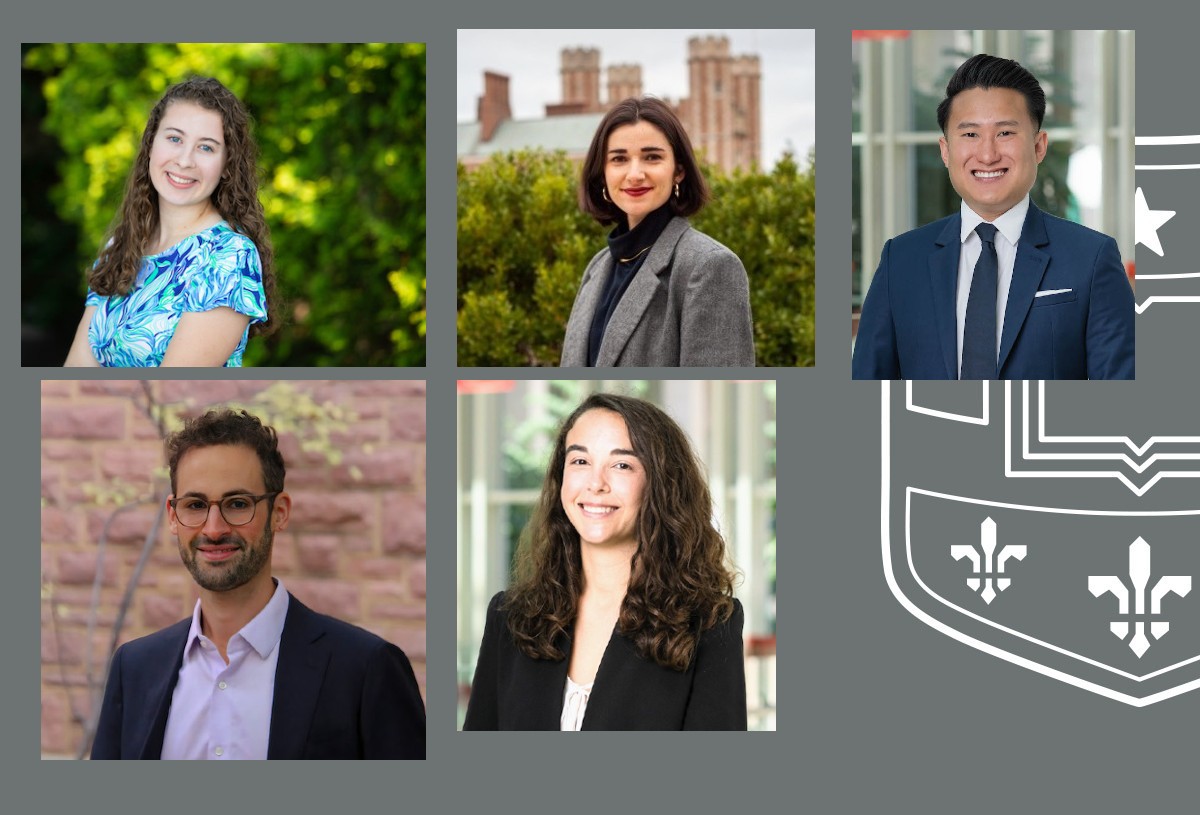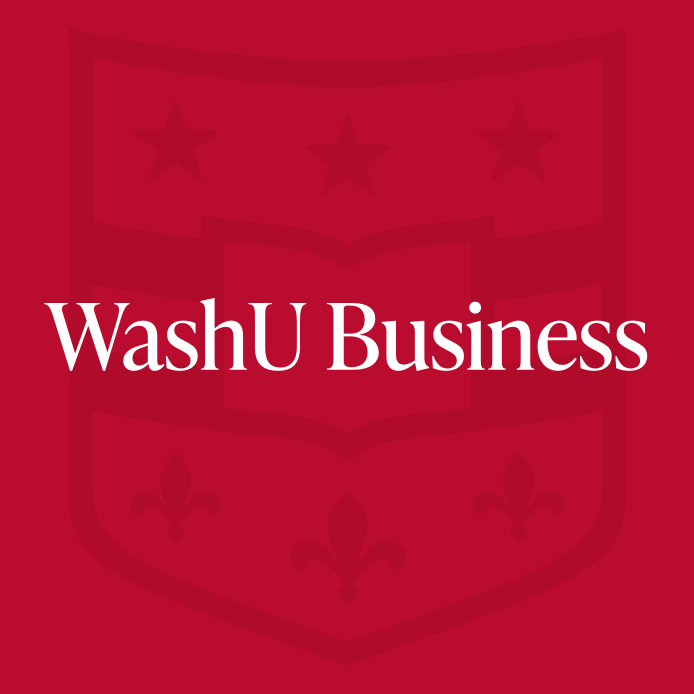Koch Center’s Family Enterprise scholars reflect on their summer projects
- September 1, 2023
- By WashU Olin Business School
- 5 minute read

The inaugural team of five Koch Center for Family Enterprise scholars worked on a variety of research projects this summer tied to family enterprise.
“While we have discussed having a formal group of scholars supporting research at the center for years, this year was our first full effort in this direction,” said Peter Boumgarden, Koch Family Professor of Practice in Family Enterprise and director of the Koch Center for Family Enterprise.
“And, wow, I am so glad we initiated these partnerships. Every one of these scholars contributed to a major strategic priority of the Koch Center.”
Here are the scholars’ individual accounts of the work they did.
Paige Copenhaver
My summer project was a thrilling mix of qualitative research and quantitative and empirical analysis. While researching the impact of accelerators on startups and specifically delving into Arch Grants, a nonprofit venture capital firm, I learned so much about the structure of startups, trends among team and founder demographics and how the injection of capital into startups can lead to better downstream outcomes.
With the help of Professors Peter Boumgarden and Barton Hamilton, the goal of this study is to determine whether firms that make it to the finalist round of the Arch Grants competition but do not receive an Arch Grant have different outcomes than firms that do receive an Arch Grant. The datasets I created encompass aspects of these firms over time, which will be the key to our analysis. Instead of studying the overall effect of multiple accelerators over a small period, this study examines one accelerator over 10 years.
So far, a simple data analysis has revealed that on average, firms that receive an Arch Grant are more likely to survive longer and raise more capital than Arch Grants finalists.
I learned so much from this project, but one of my biggest takeaways is a deeper understanding of how venture capital works and the role of accelerators in the venture capital space.
I am looking forward to continuing to work with the Koch Center and Arch Grants as this research develops!
Copenhaver is in her second year at Haverford College studying mathematical economics and German.
Claire Dempsey, MBA/MSW 2023
This summer, I worked with the Koch Center on building a novel executive education program to equip high-net-worth leaders with cutting-edge strategies for philanthropic giving. Under the direction of Margaret Schnuck Rogers, Susan Fitzpatrick, Peter Boumgarden and Jennifer Wintzer, I developed a structure and curriculum to frame participant learning and recruited facilitators and coaches to guide them in strategy development. I also worked to educate and engage stakeholders from across WashU through meeting facilitation, detailed communication plans and slide decks.
Through this fellowship, I gained in-depth knowledge of the philosophical and pragmatic concerns of philanthropy, as well as the latest trends in the philanthropic sector.
I left curious about the polarization of strategic and trust-based philanthropy and interested in ways to effectively introduce rigor into the evaluation of social sector initiatives, the impacts of which can be notoriously difficult to quantify.
Margaret Schnuck Rogers, MBA 2022, is an initiative director for the Koch Center. Susan Fitzpatrick is a Koch Center Board member and program designer. Jennifer Wintzer is the Koch Center’s program manager.
Vincent Nguyen, MBA 2023
My summer collaboration with Professors Bart Hamilton and Peter Boumgarden in researching the impact of private equity (PE) in healthcare, particularly in the fertility sector, has been profoundly enlightening. As an MD/MBA student with a keen interest in the synergy of medicine and business, this project resonated deeply.
Exploring how diverse ownership models shape healthcare clinics and strategies has uncovered a wealth of insights. PE introduces operational efficiencies, improved services and cost savings, which are crucial for fertility clinics catering to growing demand due to shifting demographics. However, potential downsides include misalignment with long-term quality goals and loss of clinical autonomy.
The focus on fertility clinics has revealed the intricate interplay between corporate ownership and healthcare outcomes. The current literature finds that PE acquisitions impact clinics in nuanced ways, with potential benefits but also mixed implications.
Guided by Professors Hamilton and Boumgarden, this research journey has enriched my understanding of the multifaceted dynamics of PE’s role in healthcare. It underscores the need to recognize benefits while being mindful of potential pitfalls. This experience will significantly influence my exploration of healthcare innovation and management, seamlessly integrating medical and business perspectives.
By studying fertility clinics, we contribute to the discourse on how corporate involvement can enhance patient well-being and healthcare performance. The complexities of healthcare mandate nuanced approaches, and this research has provided invaluable insights into navigating these complexities.
Michael Roytburd, MBA 2024
This summer, I worked on creating an online tool to help family business owners make informed, values-based decisions at key transition points for their businesses. With support from Peter and Mark Hand (UT-Arlington), I used their ongoing research to sketch out a web page where family business owners could learn about various transition options and more closely examine their motivations and values related to their businesses.
I created a survey that owners may use to better understand their motivations and desires for their businesses, grounded in academic taxonomies. This survey will allow users to compare their motivations and values to those of all anonymized survey-takers, and it will also provide users with suggestions for transition options that may fit their needs.
This project allowed me to work closely with brilliant academics, and I was treated as a colleague with valuable ideas. This was a true honor and an amazing experience. It gave me a better understanding of the challenging work that researchers do, particularly when crafting new academic theories and frameworks.
Of course, this experience was doubly valuable because it was grounded in values-based work: helping business owners make better values-based decisions. This aspect of the project was extremely important to me, and I’m grateful to Peter for the opportunity to contribute.
Jessica Timerman, MSW/MBA 2024
This summer, I focused on co-authoring the case “Values and data from the owners’ box: St. Louis City SC and the balance of purpose and performance,” with Professor Peter Boumgarden.
I learned firsthand the value of perspectives that I bring as an MSW/MBA candidate. When working with individuals in the business and social policy spaces respectively, I could see gaps in their thought processes and effectively blended these important viewpoints into the case. I wrestled with ideas around how business development is essential for the success of St. Louis, but making it work for and with marginalized communities is a complex goal along with analyzing how this plays out in practice.
I saw the power of family businesses and closely held enterprises in having the time and resources to make intentional decisions to further goals beyond financial performance, such as representing the culture of St. Louis on a global stage. I am excited to see where St. Louis City Soccer Club takes our region and what competitors present after delving into the case!
Pictured from top left clockwise: Paige Copenhaver, Claire Dempsey, Vincent Nguyen, Michael Roytburd and Jessica Timerman.
Media inquiries
For assistance with media inquiries and to find faculty experts, please contact Washington University Marketing & Communications.
Monday–Friday, 8:30 to 5 p.m.
Sara Savat
Senior News Director, Business and Social Sciences
